Trump-Kim summit in Singapore is a journey into uncharted waters, USC experts say
At stake: national security for both sides, regional stability and economic relations among China, the United States and the American Pacific Rim allies
The just-announced June 12 summit in Singapore between President Donald Trump and North Korea leader Kim Jong Un marks the first time heads of state of the United States and North Korea meet for talks. At stake is national security for both sides, regional stability in east Asia and economic relations among China, the United States and the American Pacific Rim allies. USC experts say the world will be watching – especially China.
“This summit worries China’s leaders,” said Clayton Dube, director of the USC U.S.-China Institute at the USC Annenberg School for Communication and Journalism.
“They don’t like being on the sideline for anything close to them, and nothing is closer to them than North Korea.”
Ties between the two countries are close, too: North Korea depends on China for more than 85 percent of its trade. China’s lax enforcement of U.N. sanctions benefits Chinese businesses dependent on North Korea trade. And China also fears economic pressure may result in migrants fleeing North Korea for China.
Unconventional leaders
The U.S. president’s unconventional approach to international politics – and the presidency in general – also will be in the spotlight at the Trump-Kim Singapore summit.
“Donald Trump is not like normal presidents,” said Jeffrey Fields, associate professor of the practice of international relations at the USC Dornsife College of Letters, Arts and Sciences.
“He’s a maverick and will do what he wants. He is not constrained by Republican Party ideology, so this may work to his advantage.”
Also at play: similarities between Trump and Kim.
Kim Jong Un is a lot like Trump because he’s bold and engaging in personal diplomacy.
Jeffrey Fields
“Kim Jong Un is a lot like Trump because he’s bold and engaging in personal diplomacy,” Fields said. “But we’re in unchartered territory when it comes to complete denuclearization.
“American exceptionalism – the assumption we can demand what we want and it will be done – will be put to the test.”
Trump-Kim summit in Singapore: What’s on the table
If the United States demands denuclearization without big concessions, Fields noted, not much will happen. North Korea has leverage in negotiations because, unlike Iran, it already has nuclear weapons. And the United States has misread North Korea before.
“We’ve consistently underestimated North Korea’s military, nuclear and cyberattack capabilities,” said Bart Kosko, professor of law and electrical engineering at the USC Gould School of Law and the USC Viterbi School of Engineering. “Our Cold War fears have come back with a vengeance to haunt us since North Korea detonated an H-bomb and tested long-range missiles.
“The threat is far worse than most people realize,” Kosko said.
Yet North Korea may be willing to talk because of the apparent destruction of its nuclear test site.
“We studied the nuclear test that occurred Sept. 3 in North Korea using space data and found the whole mountain edifice, Punggye-ri, collapsed and is likely nonusable for further tests,” said Sylvain Barbot, professor of Earth sciences at USC Dornsife.
“It demonstrates how space data can complement a global seismic network for monitoring clandestine nuclear tests – and it provides information about the test site relevant for North and South Korea peace talks.”



